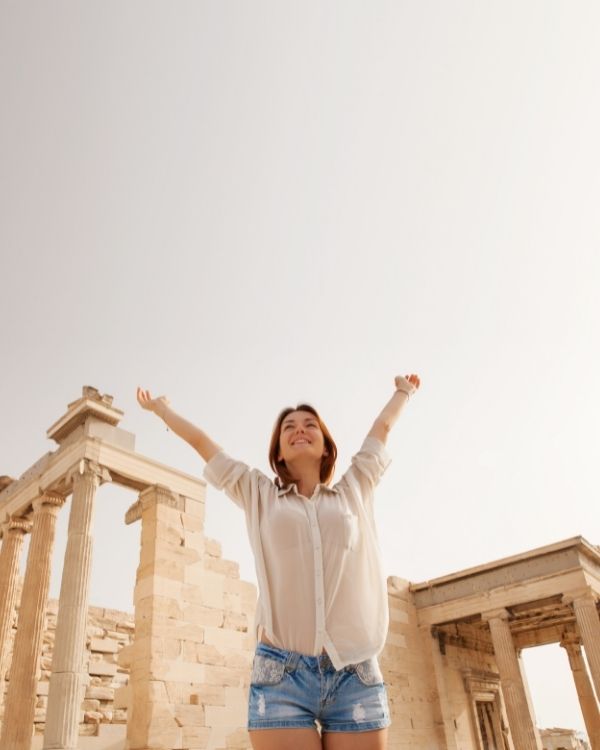


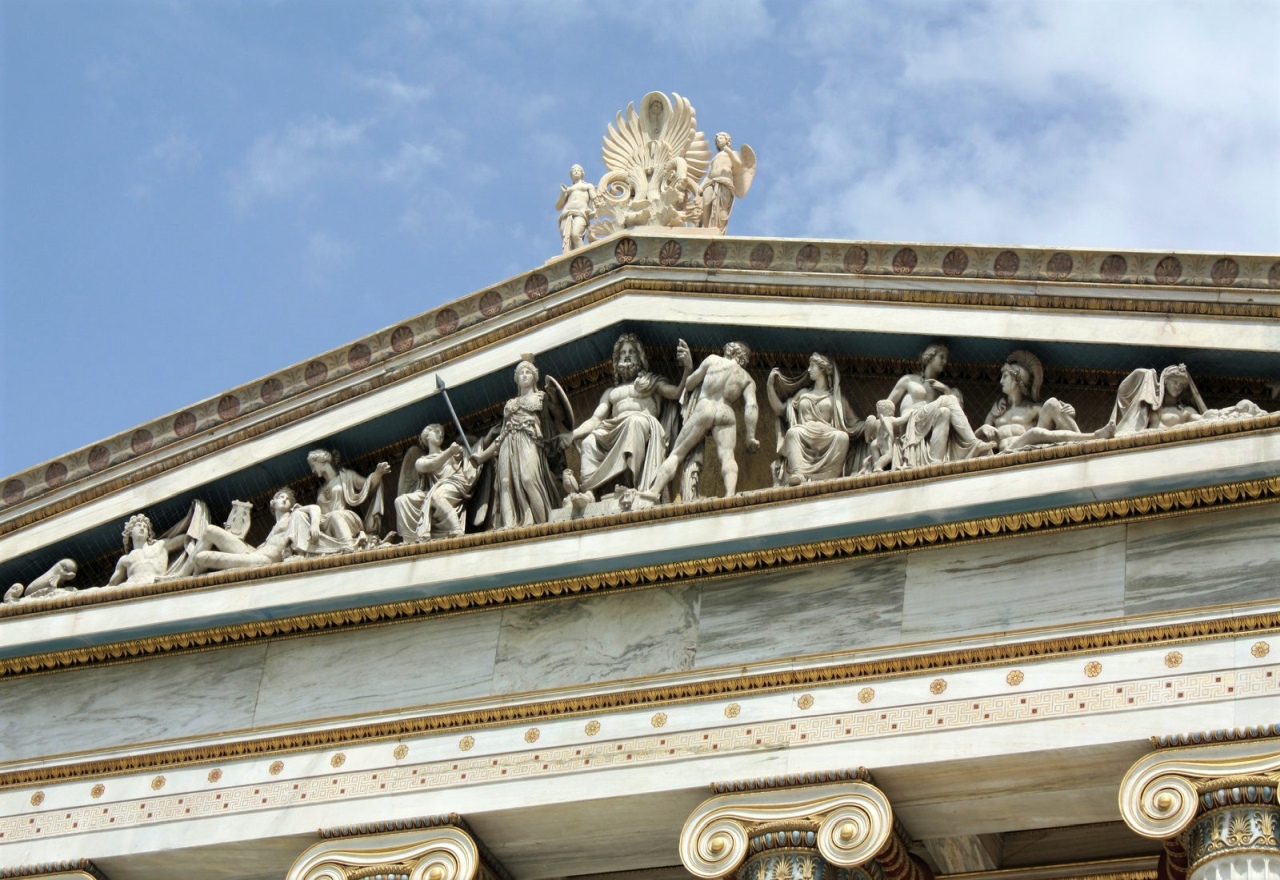
We Need Your Support!
We want to remind you that Athens by Locals is reader-supported. By booking tours, hotels, tickets, and other travel services through the links on our website, you can help us continue providing valuable content and information. Note that we receive a small commission only if you make a booking using our links at the time of your visit. So, if you're not quite ready to book yet, you can save this post and the links and return to make your booking when the time is right. We genuinely appreciate your support and are thrilled to have you in our travel community. Please don't hesitate to reach out if you have any questions or need assistance. Happy travels!
Greek culture has fascinated people from all over the world since as early as ancient times. Being the birthplace of many notable philosophers, authors, and historical figures, Greece has always been a place of interest for culture buffs. Especially Athens, the city where democracy was born and which today is home to world-class sites, attracts foreigners’ attention more than any other city.
The country’s history has had a significant effect on Athens and has even shaped urban life in modern times. From its gastronomy scene to its culture and even its inhabitants, Athens has been influenced to a great extent by Greek traditions and customs.
Maintaining these traditions has enabled people to still keep their national identity alive after centuries of hardships and foreign invasions.
But which are the main characteristics of Greek culture though? This article aims to introduce foreigners to the fascinating modern Greek culture and prepare you for your next trip to Athens.
Religion has always played a very significant role in the way Greek culture was shaped and transformed through the centuries.
The country’s national religion is the Greek Orthodox Church and 98% of the population are Christian Orthodox. 1.3% of the inhabitants are Muslims while the rest 0.7% are Catholics, Jewish, Jehovah’s Witnesses, and others.
The majority of the Muslim Greek population lives in the northern mainland while most Catholics are found in the Cycladic Islands, meaning that Athens is predominantly Christian.

You can easily see how important religion is for Greeks if you happen to visit during a Christian holiday like the Holy Week of Easter or Christmas.
Religious holidays are the most important dates of the year in Greece and are always accompanied by festive celebrations with some of the most unique customs you have ever experienced.
It is very common for families and friends to gather together to celebrate holidays such as Christmas or Easter, which have both cultural and social significance in Greek society.
Still, as society has evolved and modernized, there have been several changes in most traditional activities.
The same holds true for local cuisine. Each place around Greece is known for one or more specific dishes that, over time, have evolved to meet the needs of the new generations.
Greek gastronomy scene holds a well-deserved reputation for being one of the most delicious and healthy cuisines worldwide.
Based on the Meditteranean diet, Greek cuisine dishes have olive oil, vegetables, fish or meat, grain, and all kinds of seasonal products and spices as their main ingredients.
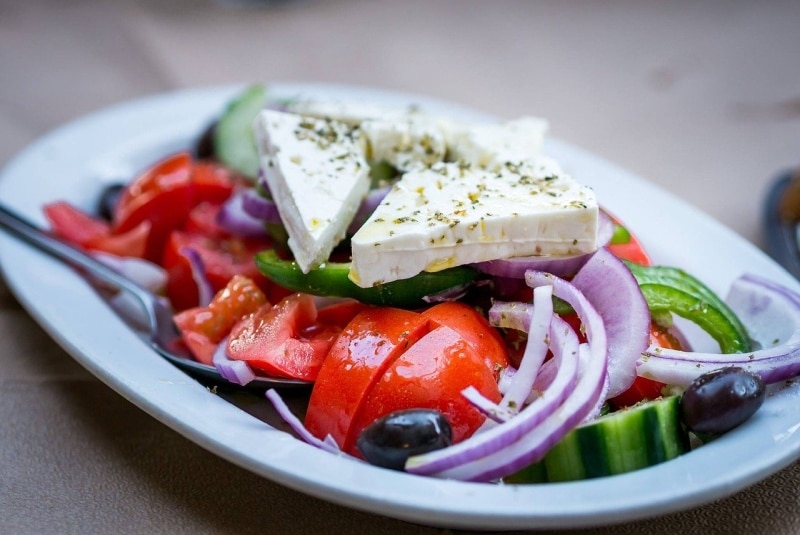
As Greeks lived under Ottoman rule for 400 years many of their traditional dishes are similar or the same as the ones you’ll find in Turkey and other neighboring countries. Some of them are tzatziki, dolmades, and moussaka.
Some dishes are cooked with slight differences in the regions around Greece or the Greek islands.
Food is an extremely important part of Greek culture. On religious holidays and celebrations, it is a tradition to invite family members and friends to home and have dinner all together.
Food is always at the center of attention and a simple dinner becomes much more than sharing a meal; it’s a sort of intimate bonding among friends and family members that is almost regarded as sacred.
In many cases, food at traditional tavernas is accompanied by local wine and live music of a special kind; the famous decades-old genre of rebetika that is played with unique Greek instruments.
Did you know that the word music comes from the Greek word “musiki”?
Musiki in Greek means the art of the nine Muses.
While for most foreigners Greek music is the theme from the movie ‘Zorba the Greek’ and bouzouki, the country’s music scene is diverse and has a long history.
Music is deeply ingrained in the culture of Athens. In ancient times, music was taught to boys from the age of six and played an essential role in the Greek educational system. The lyre and the double-reed aulos are some of the instruments used at the time.
Ancient Greek music generally included mixed choirs for spiritual, celebratory, and entertainment purposes.
Later, music was influenced by the Byzantine and Roman Empires.
In the Byzantine era, more instruments were introduced including the laouto and the santouri while later in the Ottoman Empire folk songs (Dimotika Tragoudia) emerged.
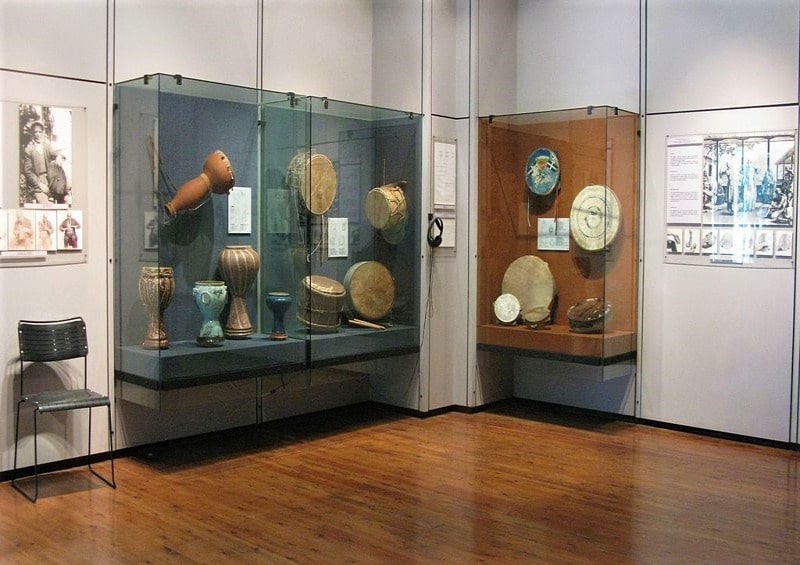
The renowned music style, Rebetiko, was introduced to Greek culture in the early 19th century.
Much has changed in the music scene ever since but until nowadays, local taverns host bands playing renowned rebetika songs with musicians that still use instruments whose origins date back millennia.
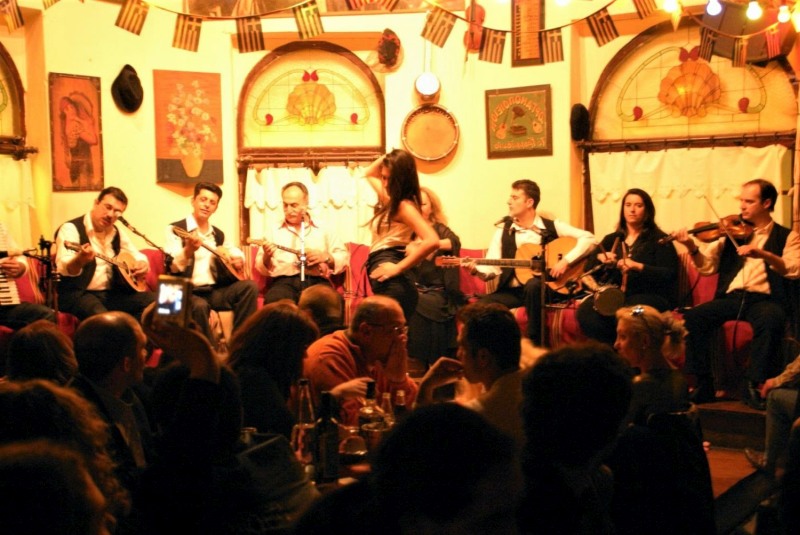
In the 20th century, many social and cultural changes carved a new destiny for local Greek folk songs. During recent decades, what can be described as nightclubs for Greek music (or simply “bouzoukia” as locals call them) have emerged throughout the city, becoming one of the most beloved forms of entertainment for Athenians.
Of course, Athens is a modern metropolis and your options for a night out don’t have to include Greek music necessarily. Just have a look below at our guide to nightlife in Athens for a few more exciting alternatives.
Whenever any discussion for Greek music is had, it is inevitable for the custom of plate smashing to be brought up by foreigners. Some have seen it in movies while others have heard about it through friends who have visited Greece before.
However, unfortunately for some -and fortunately for a few others- plate smashing during celebrations is quickly becoming a thing of the past.
The origin of the practice is unknown, but it was mainly associated with the expression of happiness, joy, and love for each other. It was also associated with the expression of appreciation for the music or the singer.

Decades ago, it was very common to witness some very passionate plate smashing at the “bouzoukia”, at small gatherings, or even family dinners. Nowadays, plate smashing is generally frowned upon by younger people who prefer to joke about it (and sometimes do it in an ironic way).
Still, it’s not entirely improbable that you’ll witness this unique spectacle yourself in a smaller town or a private party!
This is perhaps the most important element of Greek culture, although it may sound way too obvious.
The notion of family in Greece is not necessarily limited to family members but also very close friends of the family and their respective families.
In general, families tend to stick together for better or worse and anyone with a Greek family already knows that holidays and important dates such as birthdays and name days are reserved exclusively for family celebrations.
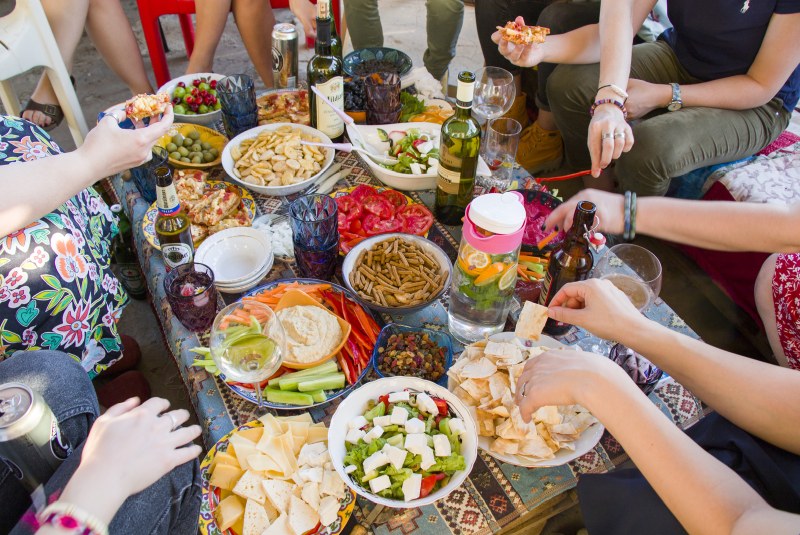
That doesn’t mean however that locals are keeping among themselves. Far from it.
Greeks are very hospitable people and will be more than happy to give directions, talk, show you around, or even invite you to a gathering.
If you ever get the chance to enjoy a celebration along with a Greek family or group of friends, you’ll quickly find out that your presence there alone is enough for them to accept you as one of their own.
Don’t be alarmed if everyone is constantly checking up on you; it’s very common for locals to look out for guests and to make sure they are comfortable – and of course, well fed!
Greeks celebrate several traditional festivities throughout the year. Here we will list some of the most important dates to look out for your next trip to Athens.
For Greeks, Easter is a major religious holiday and they have specific customs for the whole Holy Week. On Maundy Thursday women dye eggs in red color and bake traditional sweet cookies and cakes. On Good Friday, a procession following the tomb of Christ takes place in every neighborhood. On Holy Saturday the whole family goes to church and then has dinner at home and on Easter Sunday Greeks celebrate, eat and drink from early in the afternoon.
Christmas is also an important religious holiday for Greeks. It is a tradition to have turkey for lunch or dinner on Christmas day while on Christmas Eve many locals hold réveillon or hit the city’s nightclubs and bars.
Greeks celebrate the Carnival (Apokries) which lasts for three weeks and ends on Clean Monday with the beginning of Lent. The greatest celebrations take place on the final weekend and locals dress up with costumes and party in the streets.
Ohi Day is celebrated on the 28th of October every year because on that day in 1940 the Greek dictator Ioannis Metaxas said ohi (no) to the Italian forces invading the country. On that day parades take place in every neighborhood around the country.
Greek Independence Day commemorates the declaration of the Greek War of Independence against the Ottoman Empire. It is a national holiday and parades take place all over the country.
Most Greeks have been named after a saint of the Orthodox Church and they celebrate their names on the saint’s day. It is common to have visitors at home and to offer sweets and pastries or even have a big dinner with friends and family. For Greeks ‘name day’ is almost as important as birthday and is celebrated in a very similar way.
If you have ever visited Athens in the springtime before, you may have noticed the red and white bracelets on women’s heads or hands.
All over Greece, people celebrate spring by wearing bracelets made of red and white flowers, commonly referred to as Martis (translating to “March” in Greek).
They wear this bracelet for the whole month of March, and it is one of these traditions that have not changed over the 9,000 years of Greek history.
The color white symbolizes purity, while red is a symbol of passion and life. In ancient Greek, it was often believed that this bracelet would protect the wearer from all kinds of diseases and the strong light of the spring sun.
A few decades ago, people in Athens and all-around Greece used to be very superstitious and believed in all sorts of paranormal and supernatural events.
Naturally, through the course of time, these superstitions faded away but not without leaving their mark on Greek culture.
There are some people who still believe in superstitions and others that completely ignore them but one thing is for certain: you are bound to hear about one or more of them while visiting Athens.
Below we will list the most common ones.
Many believe that a person can catch “matiasma” widely known as the evil eye, by a malevolent glare from envious people. Matiasma causes injury or misfortune to others.
According to local beliefs, wearing a charm such as a blue marble glass with an eye painted on it is the best way to avoid or reduce the effects of the evil eye.
In Greek culture, the color blue (turquoise) is considered to be effective against the evil eye. Ironically, this color is also believed to be the one causing matiasma to people.
The use of garlic is, according to local beliefs, another way to prevent the evil eye, and therefore, it used to be quite common for Greeks to hang garlic at their homes’ entrances.
In villages and the suburbs, it’s a custom for people to kiss the hand of a priest and it’s also a belief that seeing a priest and a black cat on the same day it’s a sign of bad luck or an upcoming danger.
Another popular belief is that handing a knife to someone will cause a fight between the two. Therefore, Greeks usually place the knives on the table and let the other person pick them up.
According to those who believe in superstitions, sneezing means that there is someone, somewhere talking about you.
What’s even more interesting is that you can guess who that is by asking someone close to you for a random three-digit number.
Just add up the digits and find the letter of the alphabet that corresponds to the sum. That is the initial letter of the person’s name.
Seeing a black cat cross your path, breaking a mirror, or getting the evil eye may result in unfortunate situations. But if you act fast and throw some salt over your shoulder, you just might be able to escape the bad luck.
Even though there are local dialectal variations in the different regions across the country, Greece’s official language is Greek.
For many years the language was divided into katharevoussa (which means purified language) and was used by the country’s literate crowd and was taught in schools and dimotiki, which translates to popular (language) and was the one used by people in their everyday life.
However, since 1976 dimotiki is the official language of modern Greece. Unlike in other parts of Greece, Athens’ inhabitants don’t have a special local dialect or accent.
All in all, Greek culture and how it manifests in the daily life of Athens is quite a complicated matter. This guide serves as a small stepping stone to getting in touch with the city and its traditions. But the only way you can experience what local culture truly is all about is by visiting Athens and finding out for yourself!
A Quick Reminder:
Remember that Athens By Locals is here to guide you with planning the perfect trip to Athens and help you every step along the way. If you didn’t found what you’re looking for, or need any recommendations about your trip to Athens, feel free to contact us and we will do our best to help you. Please be as more detailed as possible regarding your subject so as to help you better.
If you like what you read please scroll down at the end of this page and subscribe to Athens By Locals so next time to receive more articles like this straight forward to your email. Join us on Facebook for comments, photos, and other fun stuff. If you enjoy this article please share it with your friends on Facebook.
Copyright © 2024 Athens By Locals © All rights reserved. No part of this site may be reproduced without our written permission.
Images owned by Athens By Locals. Image Banks or Companies promoted.